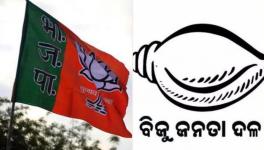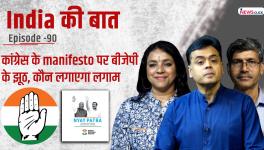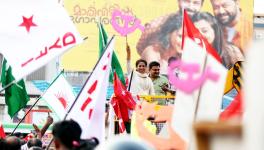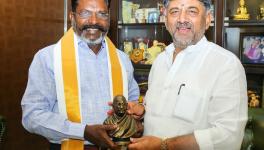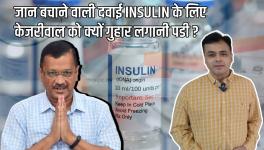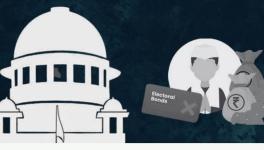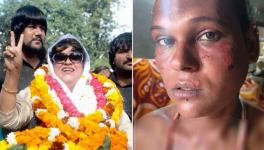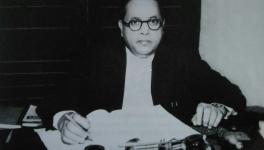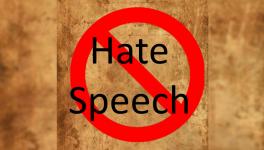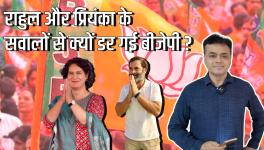Modi's Elevation – A Desperate Step
Narendra Modi's elevation as the Chairman of the BJP’s Election Campaign Committee for 2014 General Elections is seen as a gamble which will not pay the BJP. It poses a serious challenge to communal harmony and peace in the country. This elevation will make it difficult for the BJP to have electoral alliances with other political parties. The party has damaged its own prospects. D Raghunandan discusses with Anil Mishra, senior political analyst and commentator, the fallouts of Modi's elevation.
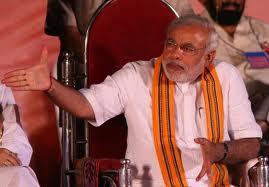
Transcript:
D. Raghunandan (DR): Hello and welcome to Newsclick. With the projection of Narendra Modi as a Prime Ministerial candidate or atleast as the campaign incharge, the BJP has set the momentum going for the General Elections of 2014. But this is likely to have, may be a positive or may be a negative response as far as the BJP and the NDA is concerned. To discuss this and related issues, we have with us today Prof. Anil Mishra, Professor of Political Science in Delhi University, a veteran political commentator and author of a book on coalition politics. Welcome to Newsclick. Anil, BJP's announcement of Narendra Modi has galvanised the election scene. Clearly, the BJP expects this will work to its advantage. Others think it will work to the disadvantage of the BJP. What is your view?
Anil Mishra (AM): Actually, in my view, it will work to the disadvantage of the BJP because BJP is a partner in NDA. So it will definitely work for the disadvantage of NDA. If NDA gets weakened, then BJP has no chance to form another government or come to power. What I think is, this would have consolidated the NDA process not the kind of propaganda which they made around Narendra Modi. But they are not confident to project any other leader because they are in a disarray for a very long time. They wanted to have a face. After Vajpayee, they didn't project anybody else. So,they have taken a gamble and they felt that if Narendra Modi is projected with Gujarat's so-called development model and with all the hype which they have created infusing a lot of money in the media whatever may be the sources in media, they would be able to create the kind of atmosphere and on that they may capitalise anti-UPA sentiments. That was, I think their view. But what they fail to understand is that in a country like India which is so diverse, where state politics have come to assert in a very positive way day by day, it is not the magic that will finally work. It is not even magic. It is not even magic of Vajpayee. At the height of the magic of Vajpayee, at the height of the Ayodhya movement, they have been able to get only 182 or something like that and they can't go beyond that. And if they can't go beyond that, I am not saying they will get there, then they will find it very difficult to have alliances.
DR: BJP's calculation or at least those who favoured projecting Narendra Modi, calculations seem to be that what they lose on this count which you have so well analysed that what they will lose on that count, they will gain through the charisma of Narendra Modi even his polarising effect will attract Hindu votes and that will offset their losses. So, although you say they should have concentrated on the NDA gains, the BJP seems to think that they can gain on the BJP front what they may lose on the NDA front.
AM: That is their wrong perception of things because what I feel, they might have thought to save the BJP even for 130–140, even if 115 because BJP has got completely disarranged. If you find out the last 2-3 years they have not been able to be effective in Parliament; they boycotted it, they did not make use of anti-UPA sentiments. Being the main opposition party, they failed to perform their role at all. And also because of inner bickerings of the party and absence of personalities like Vajpayee and Advani in the main scene and there are so many second rankings competing with each other. Some lobby of the BJP tried to project and finally gave a stamp to Modi to install these kinds of process and they might have thought to protect BJP and so they have clearly made a gamble which I think will go in vain.
DR: There are of course within the BJP itself, as you pointed out, many voices including Advani and so many others who were not happy with this decision who probably also had views somewhat similar to this that this will cost the BJP too and that is perhaps the reason why you get so many voices now. Somebody talks about some chief minister being very good, somebody says Sushma Swaraj is a very good leader and so on. Is that the reason why you get these different voices?
AM: Yes, of course, that is the reason but even now, suppose they have all reconciled for a time being to Modi, but still in their inner core, it is not that they have already settled their scores or whatever they have reconciled to it but now they have decided to go with Modi after initial jerk which was given by Advani. But if you go by state-wise where is Modi's appeal? His appeal is very limited and one thing is very sure that Hindus vote is not monolithic kind of thing. It is vertically and horizontally divided in castes and even in class and even in youth also, in women whatever you may say each region has a different choice. If you start from south, BJP in Kerala has no base, nothing, nil almost. Andhra: very inconsequential, Tamil Nadu: inconsequential, you can come to West Bengal: hardly any gain, Orissa also, in Bihar where perhaps combined strength of NDA might have given good strength which is right now 32 in the Loksabha. That would be also reduced. Their strength, if you analyse, they might improve, say, some seats in Maharashtra, OK. Might be very close fight in Rajasthan, might Gujarat may improve 2-3 streets. What about UP? UP is the main citadel where there is no chance of improvement. I tell you. Still it is polarised between Mayawati and Mulayam Singh. So where is the charisma working, I don't know.
DR: Anil, given your background in the socialist movement and your familiarity with this context, analysing against this background, what exactly do you think was the rationale behind the JD(U) deciding to break away from the NDA. Was it a calculation about the backlash from a Modi candidature. Or was it also a longer term assessment of the future of the NDA?
AM: I think, it was both. Partially it was because Nitish Kumar from the day one has voiced his reservation against Modi. He came to power twice and did not allow Modi to campaign there; main campaigner, star campaigner for BJP, he did not allow him. And then the way the BJP thrust Modi, they also thought that Nitish Kumar perhaps will not tolerate and then people forget that whatever may be said, Nitish Kumar has some kind of acceptability within Muslim community. In the last election, he got more than, roughly 25-30% votes of Muslims. It is quite substantial for him, despite the fact of aligning with BJP. This is political, as you can say, not shrewdness, but political strategy and also acumen.
DR: Sure, so would you say that Nitish has come to a conclusion now which Patnaik had come to sometime back in Orissa?
AM: Nitish Kumar's dependence on BJP was more than that of Patnaik in a sense, much deeper and Patnaik himself emerged as the leader. He carried BJP. But here slightly the situation was different because Nitish Kumar was not strong earlier, he made his way and as a chief minister he made an impact, but did not compromise on the basics with Modi. One thing can be said about Nitish Kumar consistently that he opposed Modi and finally when BJP decided about him, he did not have any choice left. No choice left. If you are consistently politically opposing Modi, then how could you accept him finally. So that would have been seen as an opportunism and Nitish Kumar, perhaps, to my mind, whatever may be right or wrong, he has retrieved his position which earlier George and others failed to retrieve.
DR: The Shiv Sena which has been one of the most steadfast allies, is a partner in the Hindutva ideology with the BJP has also been saying quite clearly that unless the NDA is strengthened, there will be no chance and therefore they are not happy with the current set-up. Yesterday and the day before, there were interviews with President of the BJP, Rajnath Singh in the media where he was asserting that other pre-poll alliances and may be post-poll alliances could come to strengthen the NDA. What is your view as to the prospects, particularly of post-poll alliances?
AM: I am not very optimistic about the post-poll alliances of NDA because of the partners, it is not that the, election is going to take place in one year or may be even earlier. If it is earlier, six months; if it is on time, it is one year. One year - it is not that long period that all those partners who are estranged from BJP and finally moved away from BJP after poll they will suddenly come and join BJP. You have to find out some excuse, some reasonable kind of what the electorate wants. Suppose, for example, if Nitish Kumar is given a good mandate from Bihar and then he joins BJP it will be betrayal and that betrayal is not permitted. Normally, people don't do that because it goes against the mandate. Mandate is not only an arithmetic term because last time Congress got 206. It is not a clear cut majority but overall people thought that BJP was rejected and some kind of secular alliance would take place.
DR: Something that has been puzzling several commentators and certainly I have been very puzzled by this. The BJP in last two elections has been making a virtue out of the fact that unlike the UPA which does not promote a candidate for prime ministership. The BJP and the NDA have projected a prime minister candidate and it is with that in mind that they projected Narendra Modi. And even now, that is the broad projection. But, in formal terms, they are still calling him only a campaign in-charge. Does this symbolise still a hesitation on the part of the BJP, some anxiety that if we project him as a prime ministerial candidate there will be a backlash. What is the explanation for this?
AM: Actually they are trying both strategy because within the BJP inside, they can say that there are people like Advani and he is just a campaign in-charge. But for the general masses, the way he will campaign and as a campaign manager he will be allowed to utter and galvanise Hindu whatever mobilisation on the basis of communal line. People have been telling me, some activists from different parts, that may create problem before elections. One has to be very cautious about it because they may create that communal tension to get heightened. Therefore, all the secular forces, even if all the differences, there should be cautioned and the people so that at least election should not take in this line because the way it is exposed then they will not have any alternative than to create this kind of atmosphere and they have started and some signs are already there. So either election commission or all these institutions, all the people have greater responsibility. Any political party can project anybody so, it is welcome in democracy. But nobody can take this kind of recourse which will disturb the entire society as such.
DR: So to sum up our discussions today, your idea is that by projecting Modi as a future Prime Minister, the BJP has done damage to its own prospects but also that it may pose a severe challenge to communal harmony and peace in this country. Is that your assessment?
AM: It is my assessment and now it is being articulated. If we go through the interviews of Nitish Kumar, recently 3 to 4 interviews he has given, he has articulated this. The man who is already in the mix of the trouble (he has recently said that the person who is in midst of controversies, you have projected him. Now also there are lots of things against him which have not yet settled, to project him as a prime ministerial candidate, I feel it is not right step in terms of political point of view. It is a step taken out of desperation. They felt that they can save BJP by this. This could be one reason. But, I don't think they will get any political dividend out of it. It is too early. They could have waited little more. I feel that the UPA II has done mistakes in terms of economic policy, they are in a denial mode, it is true that the court decides, but then the incapability and corruption gives an impression that there is no governance.
DR: So this will get to into the background and the misdeeds of the BJP will come to the foreground.
AM: That is very unfortunate for Indian politics. If that happens then what choice is left for the voters. Choice is very limited because socialists, leftists and progressive forces have also been unsuccessful in terms of, I am not talking about alliances, but about a political formation which could go to people. Now, there is some time and in between something could happen, but if it doesn't happen then it would be difficult.
DR: Thank you Anil
AM: Thank you.
Get the latest reports & analysis with people's perspective on Protests, movements & deep analytical videos, discussions of the current affairs in your Telegram app. Subscribe to NewsClick's Telegram channel & get Real-Time updates on stories, as they get published on our website.









